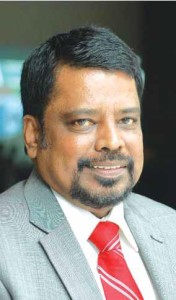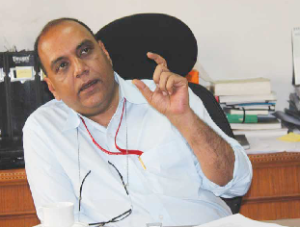Blended Model of Learning and Training
Organisation: DAV Public School, Chandrasekharpur
Website: www.davcsp.org
Objective: To empower the students by providing e-study materials to them, and to cater to the need of the 21st century learners all the teachers are made proficient in IT – enabled teaching through orientations and workshops on regular intervals
Description: Under this initiative, the students use Core i3 Systems with LAN connection. They prepare and present PPTs on different concepts. Subject teachers prepare PPT and have Audio-visual classes to introduce new concepts. Regular online courses are taken by them to keep themselves upgraded.
Target Group: Students, teachers, staffs and parents
Achievements:
• Teaching-Learning process became interactive, interesting
and vibrant
• Go Green Environment with limited paper works
Click here to read more details about this initiative
Georgean e-School Initiative
Organisation: St George’s School
Website: www.sgs.edu.in
Objective: To bring about effective, diagnostic and remedial learning through interesting e-tools providing opportunities to the students to improve upon their domain knowledge and aid in self assessment
Target Group: Students, teaching staff and their families
Description: St George’s school organises and integrates technological resources to ensure effective learning. Students are able to gain knowledge through attractive visual and audio representation of each topic that increases the attention span of students. e-Learning activities have aided in building investigative acumen of the students, making them high quality global learners.
Achievements:
• The school has received global training award – ‘Golden Peacock National Training Award for 2011’
• The classrooms have become more interesting, techno-savvy and innovative
Click here to read more details about this initiative
e-Initiatives at Greenwood
Organisation: Greenwood Public School
Website: www.greenwoodindia.org
Description: This initiative includes ICR Classrooms, NIIT Nguru IT Wizard, Educomp Smart Classes, English Language Lab, e-Library.
Objective: To sharpen up students with latest technologies
Target Group: From Classes V – XII
lick here to read more details about this initiative
Affordable Education at Unexplored Rural Areas
Organisation: Calorx Public School
Website: www.cps.calorx.org
Implementing Agency: Calorx education and research foundation
Objective: Development of the children, and creating national assets and global citizens through strong values of dedication, devotion and compassion
Description: Calorx Public School, Rajula District, Amreli was started on 26th June 2010 from Nursery to Class V to provide NCERT syllabus in English Medium education to the children of Rajula which is growing as Port City in Saurastra region of Gujarat. Today the school is up to class VIII and each and every class is equipped with ‘smart class’ where syllabus mapped lesson plan, teaching aid, CCE testing are provided.
Target Group: All the areas where English education is not available
Achievements:
• Calorx is first choice
• Provided affordable English medium CBSE education
• Catered to far flung villages
• Successfully designed and developed interactive record and play features with novel online submission for every individual recorded pronunciation
Click here to read more details about this initiative
e-School Programme
Organisation: Doon Public School
Website: www.doonpublicschool.in
Objective: To enable the students to devote complete attention towards the concepts by making learning more interactive and
to bring innovations in teaching
Description: Starting with the digital library, the school has 15000 books uploaded in the computers. It includes the latest
Encyclopedia, talking dictionary and thesaurus. Through talking dictionary, the students understand the meanings and pronunciation of the words. Digital library creates an augmented learning environment where technology is used to aim at maximising the child’s participation in the learning process
Target Group: Students of pre-primary to class 12, teachers and parents
Achievements:
• Students learn in a self directed way
• Our initiative to introduce the digital facilities in the school for education has enabled us to win the ‘Best ICT Laboratory’ in school- Digital Learning School Education for the year 2010
Click here to read more details about this initiative
Online Interactive Virtual School Portal
Organisation: Dr Kedar Nath Modi Foundation
Website: www.knmodifoundation.com
Implementing Agency: Super Infosoft Pvt Ltd
Objective: To make the students learn to use latest technologies of using the PCs, Laptops and Tablets for effective learning purposes and be abreast with technological advancements
Description: SIS’s Online Interactive Virtual School Portal initiative is taken to make teaching /learning captivating in the classroom delivery system to make the lessons innovative and enjoyable for enabling learning.
Target Group: Children from the age of 5 to 19 years
Achievements:
• Students who did not like to do home work, now look forward to doing that
• This system of teaching has helped the students to remember lessons easily as its always easy to remember what you have seen
• Teachers find this easy and effective as definitely this system is better than read out of book system
Click here to read more details about this initiative
Advancement in Information Technology
Organisation: Holy Heart Presidency School
Website: www.holyheartschools.org
Objective: To develop a powerful medium of formal and informal learning environment which will empower, those who encounter difficulties in traditional learning situations
Description: The school has taken a keen initiative in implementing the project of advancement in Information Technology. Around 90 classrooms have been provided with the facility of Educomp Smart Class system. The teachers are utilising the latest educational strategies in order to update the students with the latest learning concepts.
Target Group: School children of age from 2 to 18 years
Achievements:
• digitalLEARNING Shiksha Ratan Award 2013 by State Government of Punjab
• Students and teachers being updated with the latest education system
• Improvement in board results by leaps and bounds
• Variety in classroom stimuli
• Outreach programme to initiate awearness of English education
Click here to read more details about this initiative
Technology Aided Lessons
Organisation: Oakridge International School, Newton Campus
Website: www.oakridge.in
Objective: The basic objective of this is to cater to the needs of this generation and facilitate deeper learning and understanding
Description: As the e-school initiative states that e-Schools are rich in technology and takes advantage of the modern innovations to ensure that children get the best education possible. Oakridge International School, Newton Campus, involves all stakeholders to be a part of the technology initiative. This year, it has taken a leap by making the classrooms, aided with projectors. Students are given technology aided lessons.
Target Group: Students from Pre-primary to Grade 6
Achievements:
• Various school connects, help students to learn collaboratively
• Increases thinking skills, creativity and boosts confidence
Click here to read more details about this initiative
Étude-An Initiative for e-Learning
Organisation: Sir Padampat Singhania Education Centre
Website: www.spsec.co.in
Objective: Liberating the minds of students, thus collaborative learning along with new innovative teaching methods is the hallmark of our institution
Description: The school introduced the project ‘é-tude’, an e-Learning based programme to incorporate technical knowledge in their day to day life so as to lead the world in scientific and technical race. The students have carved a niche for them by energetically participating in different national and international competitions.
Target Group: Students
Achievements:
• Computer based testing (CBT) and on demand test (OTE) schemes for students
• The annual techno-fest ‘TECHNIKA’ and a Mega Science Festival “GENESIS” generate a lot of interest in technology, innovations and robotics
Click here to read more details about this initiative
 Indian education system is plagued by a number of ills; out dated curriculum, shortage of teachers, poor infrastructure and lack of research. The system churns out graduates, where the majority of them are unemployable. Fundamentally the education system is caught up in the industrial age while the world has moved on to the information age. The education is still treated as an assembly line system with students joining at a fixed time period in batches and graduating after a certain number of years in the system. We hardly realise that our method of teaching has to change for the Google age students. Even while expanding education, the government has chosen to set up new IIMs and IITs rather than exploit the power of networking and technology. Fundamentally the existing IIMs can easily reach out to two lakh students through the use of technology. We have failed to take advantage of the power of networking using ICT. Institutions are functioning as independent entities without many linkages with the industry. They go to the industry only for placement of their students. Government, on its part has made huge investments in ICT without a clear vision or direction. There is a big disconnect between the government, industry and the institutions. We need to fundamentally build ecosystems for knowledge creation and delivery. There is a ray of hope. NPTEL (National Programme on Technology Enhanced Learning) has built an ecosystem comprising of IITs, IISc, Google, NASSCOM, TCS, Cognizant and Indian Institutes of Information Technology (IIITs) as partners. NPTEL is about to start with certification for three computer science courses — algorithms, data structures and programming languages. While the course is free, a fee will be charged for certification. IIM Ranchi, in part-time Executive MBA program, has already recorded all the class sessions of the past two years and made them available to the new batch of students. With this the institution has managed to cut down the classroom timing by half due to these recorded lectures.
Indian education system is plagued by a number of ills; out dated curriculum, shortage of teachers, poor infrastructure and lack of research. The system churns out graduates, where the majority of them are unemployable. Fundamentally the education system is caught up in the industrial age while the world has moved on to the information age. The education is still treated as an assembly line system with students joining at a fixed time period in batches and graduating after a certain number of years in the system. We hardly realise that our method of teaching has to change for the Google age students. Even while expanding education, the government has chosen to set up new IIMs and IITs rather than exploit the power of networking and technology. Fundamentally the existing IIMs can easily reach out to two lakh students through the use of technology. We have failed to take advantage of the power of networking using ICT. Institutions are functioning as independent entities without many linkages with the industry. They go to the industry only for placement of their students. Government, on its part has made huge investments in ICT without a clear vision or direction. There is a big disconnect between the government, industry and the institutions. We need to fundamentally build ecosystems for knowledge creation and delivery. There is a ray of hope. NPTEL (National Programme on Technology Enhanced Learning) has built an ecosystem comprising of IITs, IISc, Google, NASSCOM, TCS, Cognizant and Indian Institutes of Information Technology (IIITs) as partners. NPTEL is about to start with certification for three computer science courses — algorithms, data structures and programming languages. While the course is free, a fee will be charged for certification. IIM Ranchi, in part-time Executive MBA program, has already recorded all the class sessions of the past two years and made them available to the new batch of students. With this the institution has managed to cut down the classroom timing by half due to these recorded lectures.








 “Skill development is crucial if we are to reap the benefit of demographic divided,” says RP Sisodia,Joint secretary of Higher Education, Ministry of Human Resource Development, Governmenr of India.
“Skill development is crucial if we are to reap the benefit of demographic divided,” says RP Sisodia,Joint secretary of Higher Education, Ministry of Human Resource Development, Governmenr of India.













